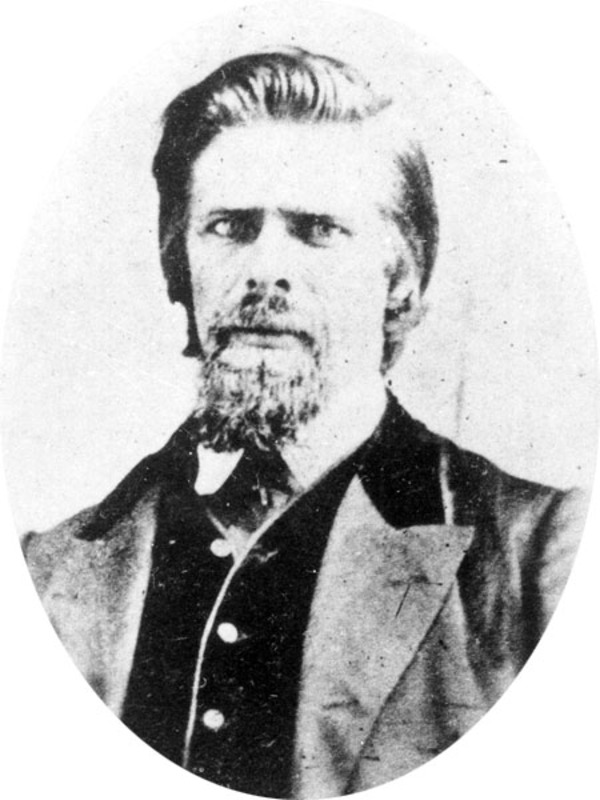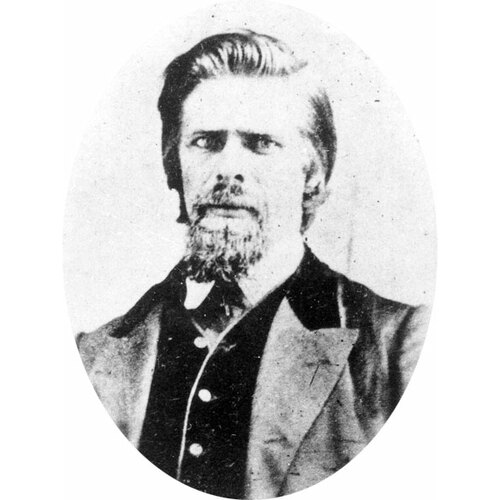
Source: Link
O’DONOGHUE, WILLIAM BERNARD, treasurer of Louis Riel*’s provisional government; b. 1843 in County Sligo, Ireland; d. 16 March 1878 in St Paul, Minnesota.
William Bernard O’Donoghue moved to New York while still a boy, having witnessed the Irish famine and the Young Ireland rebellion of 1848. He carried with him a strong antagonism towards Great Britain and an equally strong feeling of Irish patriotism. Whether O’Donoghue became an active member of the Fenian Brotherhood at this time, as some authorities suggest, is uncertain, but there can be no doubt that he sympathized with its aims.
In 1868 O’Donoghue met at Port Huron, Michigan, the Oblate Vital-Justin Grandin*, then coadjutor bishop of Saint-Boniface, and offered to serve in the western missions of the Catholic Church. Accordingly he accompanied Grandin to Red River where he became a teacher of mathematics at the college of Saint-Boniface and began to study for the priesthood. A year later he abandoned the soutane to take part in the Métis protest movement organized by Louis Riel in the autumn of 1869. On 16 November he was elected to the first convention of Red River as the representative of Saint-Boniface.
At first O’Donoghue adopted an attitude of moderation, supporting the English-speaking members of the convention in a proposal that the Hudson’s Bay Company’s Council of Assiniboia should be permitted to continue as the legislative body of the settlement; but on 22 December he helped Louis Riel seize the company’s funds at Upper Fort Garry (Winnipeg) and on the 27th he became treasurer of Riel’s provisional government. He was elected to the second convention in January 1870 and was confirmed in his appointment as treasurer on 10 February. On the 18th of the same month, he participated, along with Ambroise-Dydime Lépine*, in the capture of a number of Canadians from Portage la Prairie who had planned to overthrow the provisional government.
Nicknamed “Uriah Heep” by his enemies, O’Donoghue was, in fact, less emotional and less timid about bloodshed than Riel. He witnessed the execution of Thomas Scott* but refused to intervene on the condemned man’s behalf. He assisted in drafting the first three versions of the Métis List of Rights, but apparently had no hand in the fourth list, carried by Riel’s delegates to Ottawa in March 1870. During the remaining months of the provisional government in Red River, O’Donoghue became increasingly dissatisfied with Riel’s leadership, which he regarded as too compromising and too pro-British. Nevertheless, he remained with Riel until 24 August, when both he and Riel were forced to flee to the United States, following the arrival of Garnet Joseph Wolseley*’s troops at Fort Garry.
At this point the breach between the two men became an open one. Riel believed that O’Donoghue was more concerned with striking a blow at Great Britain than with relieving the plight of the Métis. This belief seemed justified when, in January 1871, O’Donoghue carried a secret petition to President Ulysses S. Grant asking the United States to intervene in Red River. When Grant refused to act, O’Donoghue turned to the Fenian Brotherhood. He obtained only moral support from the brotherhood, but did succeed in enlisting the active help of two Fenian leaders, John O’Neill and J. J. Donnelly. Then he drew up a constitution for the proposed Republic of Rupert’s Land naming himself as president, and, with O’Neill, led on 5 Oct. 1871 a small force of some 35 men, recruited among the unemployed labourers in Minnesota, across the Manitoba frontier. Riel’s influence prevented the Métis from joining him and the so-called Fenian invasion of Manitoba collapsed. O’Donoghue was captured by a group of Métis and taken back to Minnesota.
No proceedings were taken against O’Donoghue in the United States for his filibustering expedition against Manitoba, but in Canada he was expressly exempted from the amnesty granted Riel and Lépine in 1875. As a result of the advocacy of John Costigan*, an Irish-Canadian member of the federal parliament, the Canadian government agreed to extend the clemency of the crown to O’Donoghue in 1877. Following his return to the United States, O’Donoghue had been employed as a teacher in District 13, Dakota County, Minnesota. In 1877 he moved to Rosemount where he ran unsuccessfully for the post of county superintendent of schools. Meanwhile he became engaged to Mary Callan, daughter of James Callan, county commissioner of Dakota County. They were, however, never married. In 1878 O’Donoghue was taken to St Paul where he died of tuberculosis on 26 March 1878. His fiancée died several weeks later on 3 May 1878. The former treasurer of the provisional government was buried in the old St Joseph’s cemetery, three miles from Rosemount, the cost of the burial and headstone being borne by his American friends.
Alexander Begg, Begg’s Red River journal (Morton); The creation of Manitoba; or, a history of the Red River troubles (Toronto, 1871). “L’invasion fénienne au Manitoba, un journal contemporain,” G. F. G. Stanley, édit, RHAF, XVII (1963–64), 258–68. Dom. ann. reg., 1879, 33, 40, 114, 361. Le Jeune, Dictionnaire, II, 377. J. K. Howard, Strange empire; a narrative of the northwest (New York, 1952). J. P. Robertson, A political manual of the province of Manitoba and the North-West Territories (Winnipeg, 1887), 152. Stanley, Birth of western Canada, 98–174; Louis Riel.
Cite This Article
George F. G. Stanley, “O’DONOGHUE, WILLIAM BERNARD,” in Dictionary of Canadian Biography, vol. 10, University of Toronto/Université Laval, 2003–, accessed February 26, 2026, https://www.biographi.ca/en/bio/o_donoghue_william_bernard_10E.html.
The citation above shows the format for footnotes and endnotes according to the Chicago manual of style (16th edition). Information to be used in other citation formats:
| Permalink: | https://www.biographi.ca/en/bio/o_donoghue_william_bernard_10E.html |
| Author of Article: | George F. G. Stanley |
| Title of Article: | O’DONOGHUE, WILLIAM BERNARD |
| Publication Name: | Dictionary of Canadian Biography, vol. 10 |
| Publisher: | University of Toronto/Université Laval |
| Year of publication: | 1972 |
| Year of revision: | 1972 |
| Access Date: | February 26, 2026 |



